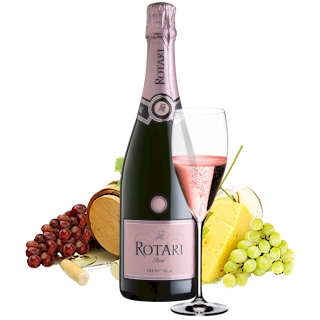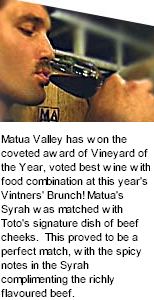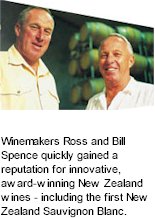


Back in the early 70’s, the vision of Matua Valley’s founders Ross and Bill Spence was to revolutionise the still fledgling New Zealand wine industry, taking advantage of unique regional qualities to create innovative and distinguished wines – the kind they wanted to drink themselves. They succeeded, beyond their wildest dreams. Today, Matua Valley wines are acclaimed and highly sought after throughout the world.

After six years developing their craft in the industry, the brothers established the Matua Valley winery in 1973. From their first successful vintage, produced in the old Tin Shed at Auckland, the brothers went on to win awards and accolades from Sydney to London. Their greatest achievement in these early days was the production of the first New Zealand Sauvignon Blanc. Today, Matua Valley is well on the way to becoming a globally respected fine wine brand. Such recognition will be the Spence brothers ultimate achievement, and a benchmark for other New Zealand winemakers to aspire to.
Viticulture is the science, art, or process of cultivating grape vines. Matua Valley have always had a hands on approach to this science and art. The philosophy is simple, to produce the best quality fruit possible, with consistency from vintage to vintage. But simple doesn't mean easy - there's a lot of hard work involved. The winemakers at Matua are fortunate to have a member of the founding family, Simon Spence, managing both the company-owned vineyards and the contract growers. His role is to keep a close eye on all the vineyards, ensuring maximum productivity and consistent quality. These goals are achieved by harnessing particular viticultural techniques for each vineyard based on their terrior, a combination of topography, soil and climatic conditions.
Mark Robertson, formerly Matua's chief winemaker, credits Simon's results in the vineyard as one of the key factors in achieving our superior quality wines. Grapevines go through an annual cycle, involving a time-honoured series of viticultural tasks. Dormant over the winter, the vines are pruned, shoots are trained and extra foliage is plucked by hand to give the grapes maximum sunlight exposure and to concentrate the flavours. Matua monitors the vines throughout the growth cycle, looking for any sign of pests or disease. As members of a sustainable wine growing programme, the Matua vignerons intervene at the last possible moment to minimise spray requirements.

Thinning of the vines is carried out systematically to ensure a balanced fruit to leaf/vine ratio, and to maximise quality. Netting of the vines is conducted to provide protection from birds. Picking is only done at the time of optimum ripeness and flavour development, in close consultation between the viticulturalists and the winemakers.
Matua's winemakers are wine lovers, always looking for new ideas and applying the best of them to the production of the wines. They rely heavily on optimally ripe fruit to make the distinctive wines. Special pride is taken in the produce extracted from the older vineyards. The last twenty five years have seen the gradual evolution of some very special styles which are getting better with each vintage. Winemaking is an art, a craft and a science that has evolved over many centuries. Like all crafts, it improves with repeated practice and with the judicious combination of ancient techniques and modern technology.
Premium varietals are always hand-picked at Matua, a gentle balloon press is used to extract as much juice as possible without crushing the seeds (tannins come from the seeds). White grapes are pressed within hours of their arrival at the winery, quickly separating the juice from the skins. However, extended skin contact, called maceration, is necessary before pressing wine off red grapes. The juice extracted after normal pressing for white wines and after fermentation for reds. Press wine has a deeper colour and often more tannins than free-run juice. Wineries often blend a portion of press wine back into the main cuvée, to add backbone.
Immediately after bottling, wine frequently goes into a state of bottle shock. Recovery may take a few weeks or months, after which the wines are released for sale. The vast majority of Matua's wines are crafted to be consumed shortly after release, when they are at their freshest.
